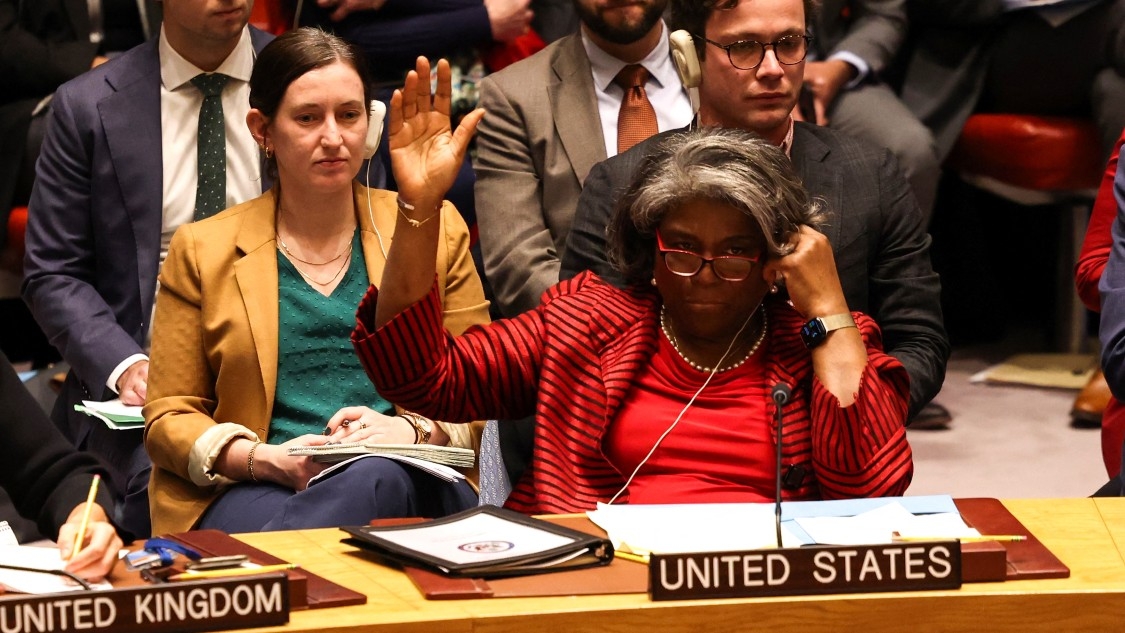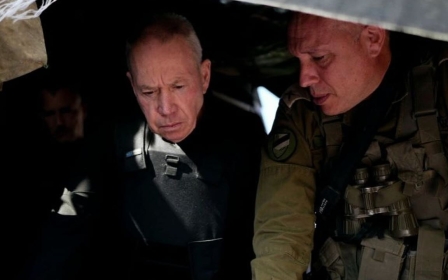War on Gaza: UN Security Council passes toned-done Gaza resolution as US, Russia abstain

The United Nations Security Council on Friday approved a diluted resolution that calls for a boost of humanitarian aid to Gaza and for urgent steps "to create the conditions for a sustainable cessation of hostilities" between Hamas and Israel.
The passage of the resolution comes after a week of delays and intense negotiations as diplomats aimed to avoid a veto by the United States, one of the five permanent members of the council. It also comes amid an increasingly devastating humanitarian situation for Palestinians in Gaza amid Israel's military assault.
Thirteen of the 15 council members voted in favour of the resolution, drafted by the United Arab Emirates, while the US and Russia abstained and allowed the measure to pass.
In the bid to avoid the US veto, diplomats weakened the resolution's original language calling for an urgent cessation of hostilities in the war in Gaza. The move was met with anger and frustration from Arab and Muslim-majority countries, as well as Russia.
Moscow put forth a last-minute amendment to include a call for an urgent pause to the war, but Washington vetoed the move.
Stay informed with MEE's newsletters
Sign up to get the latest alerts, insights and analysis, starting with Turkey Unpacked
"By signing off on this, the council would essentially be giving the Israeli armed forces complete freedom of movement for further clearing of the Gaza Strip," Russia's UN Ambassador Vassily Nebenzia told the council before the vote, which it abstained from.
The adopted resolution "calls for urgent steps to immediately allow safe, unhindered, and expanded humanitarian access and to create the conditions for a sustainable cessation of hostilities."
Follow Middle East Eye's live coverage of the Israel-Palestine war
Aside from the watered-down language around calls for a ceasefire, another key negotiating point was an initial proposal for UN Secretary-General Antonio Guterres to establish a mechanism in Gaza to monitor aid from countries not party to the war.
Instead, a compromise was reached to appoint a coordinator to establish a UN mechanism for accelerating aid to Gaza through states not party to the war.
The coordinator would also be responsible "for facilitating, coordinating, monitoring, and verifying in Gaza, as appropriate, the humanitarian nature" of all aid going into the enclave.
Resolution has become 'increasingly meaningless'
The vote comes amid an increasingly devastating humanitarian situation inside Gaza. After Hamas led an attack on southern Israel on 7 October that killed 1,200 people, Israel's military response on the enclave has killed more than 20,000 Palestinians, the majority being women and children, according to the health ministry.
Israeli bombs have targeted UN shelters, schools, and hospitals. Around 90 percent of Gaza's population has been displaced by the war, and the UN is warning that the Strip is now on the verge of famine.
The UN Security Council attempted to pass two previous resolutions on Gaza over the past several weeks, but the measures were vetoed by the US over their calls for a ceasefire.
Following the vetoes by the US at the Security Council, the 193-member UN General Assembly voted overwhelmingly in demand of a humanitarian ceasefire. And with there being no veto power in the General Assembly, the resolution ultimately passed despite US disapproval.
'Biden's changes will help ensure that Israel's slaughter in Gaza continues'
- Trita Parsi, Quincy Institute
Israel and its close ally the US have been steadfast in their opposition to a ceasefire, claiming it would only benefit Hamas.
The US has instead shown support for pauses in fighting to protect civilians and free hostages taken by Hamas. However, the recent votes at the UN have pointed to Washington becoming increasingly isolated in its fervent backing of Israel's war in Gaza.
Analysts have said that the compromises made by diplomats to avoid the US vetoing the measure have resulted in a resolution that will ultimately have limited bearing on the humanitarian situation in Gaza.
"The other countries in the Council agreed to several delays to bring the US along, but in the process, the resolution became increasingly meaningless. Biden managed to delete the call for suspension of hostilities as well as the establishment of a robust UN inspection mechanism in Gaza," Trita Parsi, vice president of the Quincy Institute, said in a post on X, formerly Twitter.
"Biden's changes will help ensure that Israel's slaughter in Gaza continues while minimizing the UN's insight into what increasingly appears to be a genocide."
Middle East Eye delivers independent and unrivalled coverage and analysis of the Middle East, North Africa and beyond. To learn more about republishing this content and the associated fees, please fill out this form. More about MEE can be found here.




